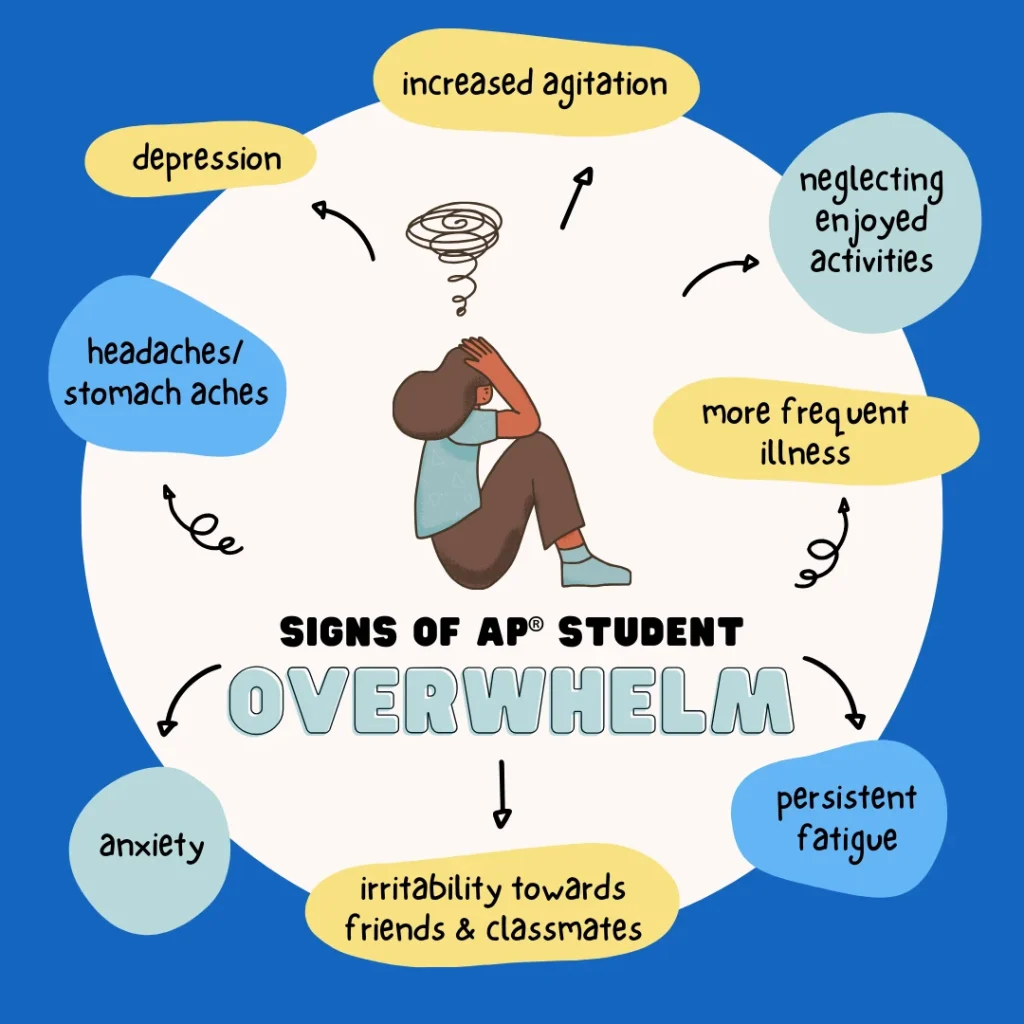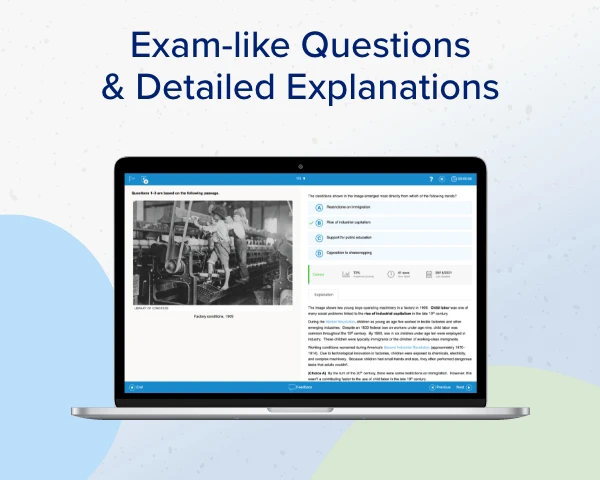One of the best outcomes of open enrollment within AP® programs is that it has opened the door of possibilities for students who otherwise would have never been able to take college readiness courses in high school. This has increased equity in the AP classroom and equipped more students with college readiness skills than ever before.1 That being said, when students who are not used to the rigors of AP courses take them for the first time, they can very easily feel overwhelmed by the sheer amount of work and the difficulty of mastering college-level content that is expected of them.
This isn’t solely the case with students who are new to AP, either. Feeling overwhelmed is an all too familiar struggle for most high school students in AP classes.2 The advanced classroom is an environment of high expectations and demanding schedules, which can leave even the highest-achiever feeling like they can barely keep their head above water. As educators, it’s our duty to help with stress management for high school students and support them in their academic journey.
Identifying Overwhelmed Students
In truth, students–especially those in demanding AP courses–are bound to experience some level of high school stress. This is expected, and a little bit of AP exam stress can actually benefit students because it pushes them to perform to the best of their ability.3 Too much student stress, however, can lead to anxiety and overwhelm. Feelings of overwhelm and anxiety can sometimes show up with AP students in the form of a few signs that educators should watch for. These signs may include increased agitation, anxiety, or depression, along with more frequent illness, physical discomfort like headaches or stomach aches, and persistent fatigue. Neglecting previously enjoyed activities or responsibilities and difficulty concentrating might be observed, as well.2

According to a American Psychological Association (APA) 2017 survey, common student stress symptoms among teenagers include insomnia, unhealthy eating habits, missed meals, feelings of anger, nervousness, or anxiety, persistent fatigue, and irritability towards friends and classmates.4 Educators can encourage parents to be vigilant with identifying symptoms and the causes of stress in high school students, too.
Causes of AP Student Overwhelm (and What to Do About Them)
In the challenging landscape of AP classes, students often find themselves on a high school stress treadmill, struggling to maintain the pace. Understanding the causes of this academic overwhelm, apart from the typical AP exam stress, is critical in order to help these young minds navigate the pressures of advanced placement rigor with applicable solutions.
Cause of Overwhelm |
Applicable Solution |
Content difficulty & heavy workloadAP classes are renowned for their rigorous curriculum and the demand for a deep understanding of complex subject matter. Students taking multiple AP courses experience a significant accumulation of assignments, projects, and tests, which intensifies their workload. This increased workload, combined with elevated content difficulty, often results in high levels of stress and feelings of overwhelm among AP students. 2 |
Check-in with students and encourage them to ask for helpWhen students feel overwhelmed with the difficult content and heavy workload expectations in an AP class, AP teachers can help by regularly checking in with them. 5 They can gauge student stress levels and offer them a helping hand. Encouraging students to ask for help fosters an open and supportive classroom atmosphere where students feel comfortable seeking assistance when the challenges of AP coursework become overwhelming. |
The pressure to be academically perfectThe self-imposed pressure to excel in AP courses can lead to overwhelming student stress and heightened academic expectations. Many AP students grapple with the intense drive to outperform their peers, not only academically but also by taking on the most challenging course load. 2 This relentless pursuit of academic perfection is one of the main causes of stress in high school students, making it vital for educators to provide support and guidance throughout the AP journey. |
Create an environment of progress over perfectionIt’s no surprise that high-achieving AP students can become overwhelmed by self-imposed academic perfectionism. Teachers can promote stress management for high school students by fostering a classroom environment that alleviates pressure and anxiety, creating a safe space for students to grow and learn. 5 Additionally, emphasizing the value of progress over absolute perfection encourages students to embrace their journey of improvement and celebrate their achievements along the way, reducing the burden of unrealistic expectations. 6 |
Disorganization & OvercommitmentIn the fast-paced world of AP classes, disorganization and overcommitment often join forces, making it no surprise that a staggering 87 percent of students, according to a 2019 survey, have experienced moments of feeling utterly overwhelmed throughout the school year. 7 The sheer volume of AP coursework, extracurricular activities, community service, and part-time jobs can create a relentless juggling act, leaving students grappling with high school stress and time management challenges. |
Teach students to stay on top of a calendar with “do” datesAP educators play a vital role in guiding students through the chaos of disorganization and overcommitment. One effective strategy is teaching students the art of time batching with a calendar planner. By focusing on “do” dates for studying and assignments instead of just their due dates, students learn to allocate dedicated time for meaningful work, which significantly improves their organization and time management skills. 5 This approach not only reduces feelings of overwhelm but also enhances overall productivity. |
Inefficient study habits and ineffective resourcesInefficient study habits combined with a lack of resources can be a recipe for overwhelm among AP students. Struggling with inadequate study techniques and limited access to educational resources can lead to academic stress and anxiety. It’s essential for educators to address these challenges by providing guidance on effective study methods and ensuring students have access to the necessary tools and materials to succeed in their advanced coursework. |
Use active recall to reduce academic stressAP teachers can significantly support overwhelmed students facing inefficient study habits and limited resources by offering quality AP study materials, like UWorld’s Learning Tools for AP Courses. These resources promote genuine learning with active recall, a technique proven to enhance retention and understanding. 8 UWorld’s Learning Tools engage students in active recall by presenting challenging questions, explanations, and detailed rationales, encouraging them to actively retrieve and apply their knowledge, ultimately reducing academic stress and improving each student’s overall learning experience. |
Overcoming Student Stress and Overwhelm in the AP Classroom
Addressing the feeling of being overwhelmed in the AP classroom is not just a goal; it’s a necessity. The AP classroom can be a challenging environment, but with the right guidance and strategies, students can thrive. As educators, we play a pivotal role in student success. By fostering open communication, creating a positive classroom atmosphere, and emphasizing progress over perfection, we can help AP students not only survive but also thrive on their academic journey.
Remember–growth and success are attainable, and by helping educators work together with their students to keep feelings of being overwhelmed at bay, UWorld strives to ensure that every student reaches their full potential.

References
- Regional Educational Laboratory at Mathematica. (2021, May). Fact sheet: Expanding access to Advanced Placement courses. REL Mid-Atlantic. https://ies.ed.gov/ncee/rel/regions/midatlantic/app/Docs/Infographics/RELMA_AP_offerings_Factsheet_508.pdf
- Peyrat, G. (2021, November 17). The pressures of taking AP classes. The BFA Mercury. https://bfamercury.org/5049/opinion/the-pressures-of-taking-ap-classes/
- Sanders, R. (2013, April 16). Researchers find out why some stress is good for you. Berkeley News. https://news.berkeley.edu/2013/04/16/researchers-find-out-why-some-stress-is-good-for-you
- Bethune, S. (2014). American Psychological Association survey shows teen stress rivals that of adults. APA.org. https://www.apa.org/news/press/releases/2014/02/teen-stress
- Gerstenblith, S. (2021, May 22). How to support overwhelmed middle and high school students: 3 tips for parents. enhancingyourstrengths.com. https://www.enhancingyourstrengths.com/post/how-to-support-overwhelmed-middle-and-high-school-students-3-tips-for-parents
- Glickman, A. (2022, October 6). Former Stanford academic coach: How to help an overwhelmed student. Grown and Flown. https://grownandflown.com/help-your-overwhelmed-college-student/
- Pascoe, M. C., Hetrick, S. E., & Parker, A. G. (2019, April 11). The impact of stress on students in secondary school and higher education. International Journal of Adolescence and Youth. https://www.tandfonline.com/doi/full/10.1080/02673843.2019.1596823
- Azevedo, K. (2023, September 11). How to feel less overwhelmed in school: 5 tips for students. SchoolHabits. https://schoolhabits.com/how-to-feel-less-overwhelmed-in-school-5-tips-for-students/




